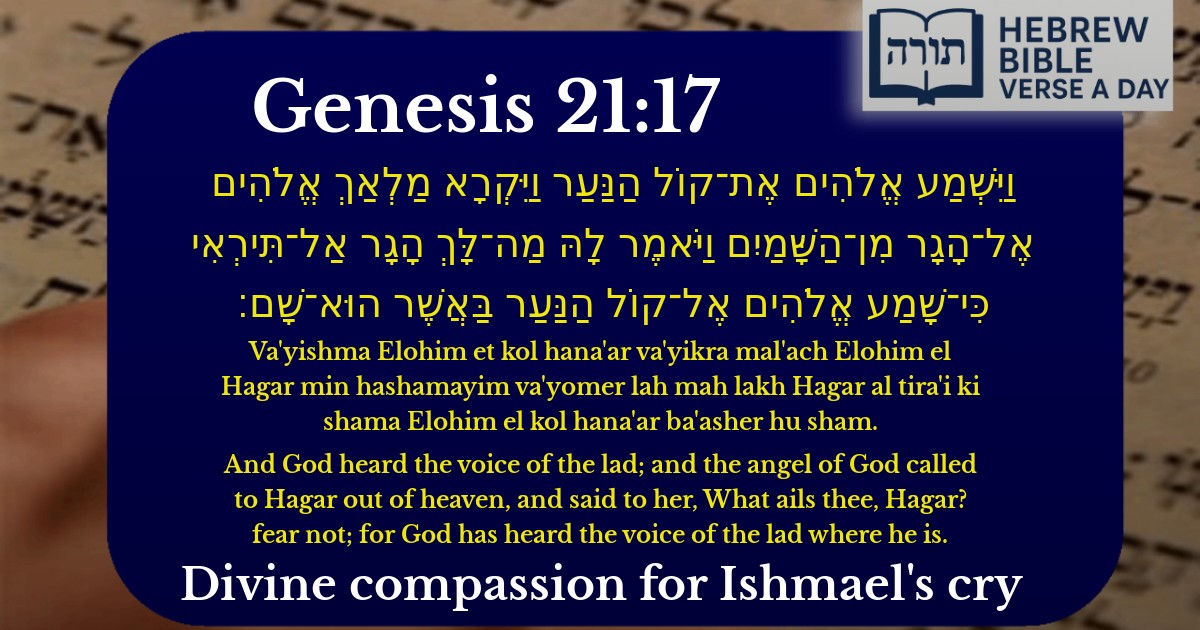Join Our Newsletter To Be Informed When New Videos Are Posted
Join the thousands of fellow Studends who rely on our videos to learn how to read the bible in Hebrew for free!
Hebrew Text
וַיִּשְׁמַע אֱלֹהִים אֶת־קוֹל הַנַּעַר וַיִּקְרָא מַלְאַךְ אֱלֹהִים אֶל־הָגָר מִן־הַשָּׁמַיִם וַיֹּאמֶר לָהּ מַה־לָּךְ הָגָר אַל־תִּירְאִי כִּי־שָׁמַע אֱלֹהִים אֶל־קוֹל הַנַּעַר בַּאֲשֶׁר הוּא־שָׁם׃
English Translation
And God heard the voice of the lad; and the angel of God called to Hagar out of heaven, and said to her, What ails thee, Hagar? fear not; for God has heard the voice of the lad where he is.
Transliteration
Va'yishma Elohim et kol hana'ar va'yikra mal'ach Elohim el Hagar min hashamayim va'yomer lah mah lakh Hagar al tira'i ki shama Elohim el kol hana'ar ba'asher hu sham.
Hebrew Leining Text
וַיִּשְׁמַ֣ע אֱלֹהִים֮ אֶת־ק֣וֹל הַנַּ֒עַר֒ וַיִּקְרָא֩ מַלְאַ֨ךְ אֱלֹהִ֤ים <small>׀</small> אֶל־הָגָר֙ מִן־הַשָּׁמַ֔יִם וַיֹּ֥אמֶר לָ֖הּ מַה־לָּ֣ךְ הָגָ֑ר אַל־תִּ֣ירְאִ֔י כִּֽי־שָׁמַ֧ע אֱלֹהִ֛ים אֶל־ק֥וֹל הַנַּ֖עַר בַּאֲשֶׁ֥ר הוּא־שָֽׁם׃
וַיִּשְׁמַ֣ע אֱלֹהִים֮ אֶת־ק֣וֹל הַנַּ֒עַר֒ וַיִּקְרָא֩ מַלְאַ֨ךְ אֱלֹהִ֤ים ׀ אֶל־הָגָר֙ מִן־הַשָּׁמַ֔יִם וַיֹּ֥אמֶר לָ֖הּ מַה־לָּ֣ךְ הָגָ֑ר אַל־תִּ֣ירְאִ֔י כִּֽי־שָׁמַ֧ע אֱלֹהִ֛ים אֶל־ק֥וֹל הַנַּ֖עַר בַּאֲשֶׁ֥ר הוּא־שָֽׁם׃
🎵 Listen to leining
Parasha Commentary
📚 Talmud Citations
This verse is quoted in the Talmud.
📖 Rosh Hashanah 16b
The verse is referenced in the context of discussing divine judgment and how God hears the cries of the oppressed, particularly in relation to the judgment of individuals on Rosh Hashanah.
📖 Sanhedrin 104b
The verse is cited in a discussion about the merit of the righteous and how God responds to their prayers, using the example of Ishmael's cry being heard by God.


Understanding the Verse in Context
The verse (Bereishit 21:17) describes the moment when Hagar and her son Yishmael are in distress in the wilderness after being sent away by Avraham. Yishmael is near death from thirst, and Hagar cries out in despair. The verse emphasizes that "God heard the voice of the lad", indicating divine compassion even in a seemingly hopeless situation.
Rashi's Commentary
Rashi explains that the phrase "the voice of the lad" refers to Yishmael's prayers or cries. He notes that the verse does not say "the voice of Hagar," even though she was also crying, because Yishmael's merit was greater at that moment. Rashi cites the Talmud (Rosh Hashanah 16b), which teaches that the judgment of a person is based on their current state ("ba'asher hu sham"—"where he is"), not their past or future actions.
Rambam on Divine Providence
Rambam (Hilchot Teshuva 3:1) discusses how divine judgment takes into account a person's present spiritual state. This aligns with the phrase "ba'asher hu sham", emphasizing that Yishmael was judged favorably at that moment due to his sincere cries, despite his later negative actions (as described in Midrashic sources).
Midrashic Insights
The Angel's Message to Hagar
The angel's words, "What ails thee, Hagar? Fear not", demonstrate divine reassurance. The Malbim explains that Hagar had lost hope, thinking Yishmael would die, but the angel reminded her that Hashem hears even the silent prayers of those in distress (Tehillim 145:19). The phrase "where he is" reinforces that salvation is not delayed—Hashem responds immediately to sincere repentance or suffering.
Halachic and Ethical Lessons